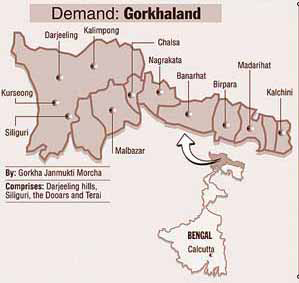Why in news?
The agitation for a separate Gorkhaland state has been going on in West Bengal.
What is need for addressing the Gorkhaland?
- The Nepalese and Lepchas living in Darjeeling and the adjoining areas have a more distinct culture and history than the Bengalis in rest of the state.
- But since 1835 Darjeeling has been administered by the authorities in Kolkata.
- The agitations are also becoming costly for West Bengal and the country, economically and for other reasons.

How this conflict can be solved without bifurcation?
- Article 244 A provides for an autonomous state for certain tribal areas in Assam with its own legislature and council of ministers.
- By a small constitutional amendment, the applicability of this article can be extended to West Bengal even other states.
- This will enable the establishment of an Autonomous State of Gorkhaland, with a legislature and council of ministers within the existing state of West Bengal without bifurcating it.
What will be advantages of such decision?
- This solution will enable West Bengal to return to the path of development and welfare.
- The Autonomous State can concentrate on the aspirations and welfare of the people of the region.
- It can be an opportunity to secure all-round advancement of the STs, Scheduled Castes (SCs), and Socially and Educationally Backward Classes and the poor.
- This solution can be extended to other states where there is a demand for the formation of new states.
- But a massive drive to build public opinion, both among Nepali-speaking and Bengali-speaking people, has to be undertaken.
- The Nepali-speaking people must be told that an autonomous state will enable them to assume control over their future and development.
- Similarly, Bengalis should be assured that they will not lose Darjeeling, which will continue to be part of West Bengal while being the capital of the Autonomous State of Gorkhaland.
Source: The Indian Express
